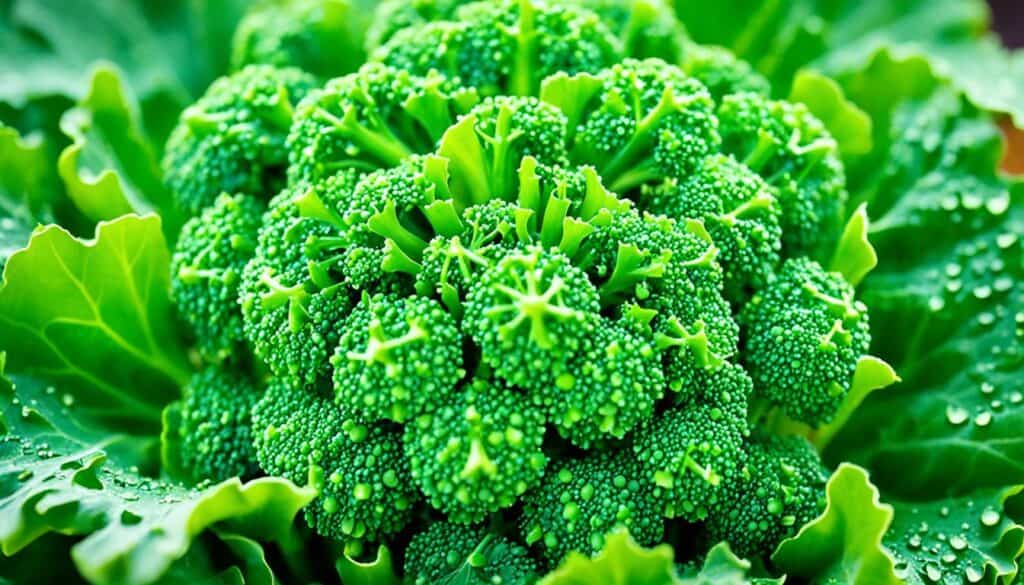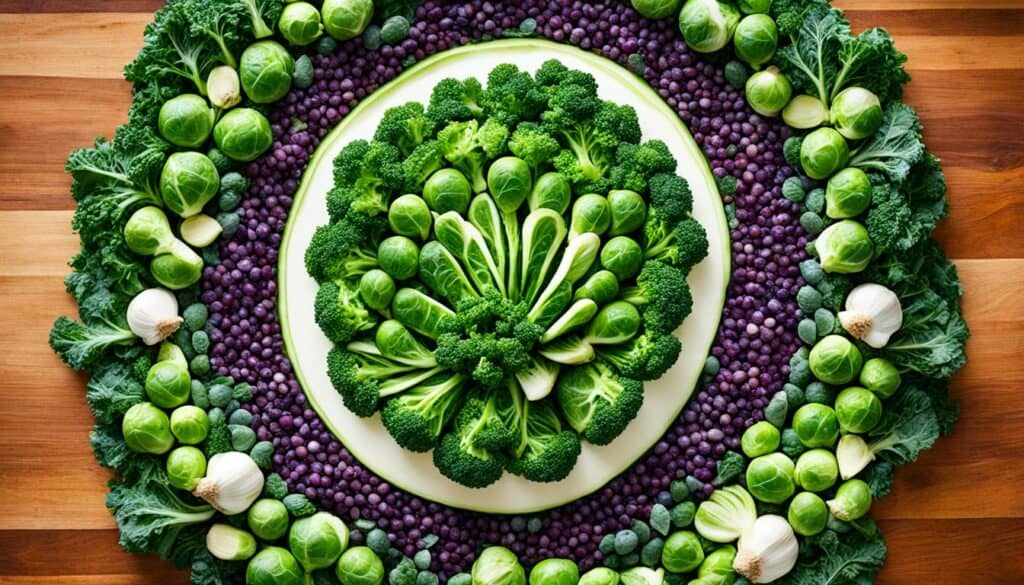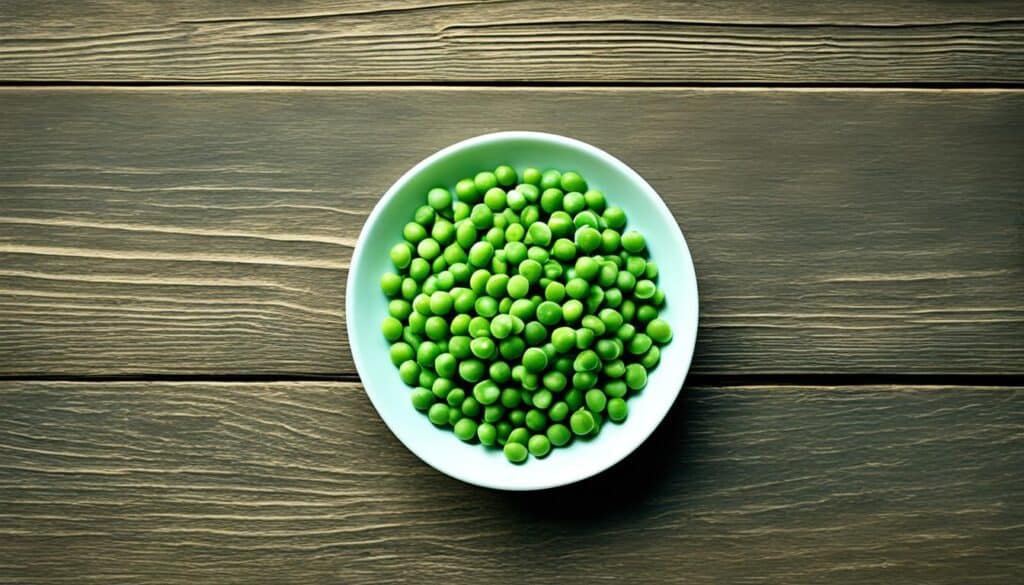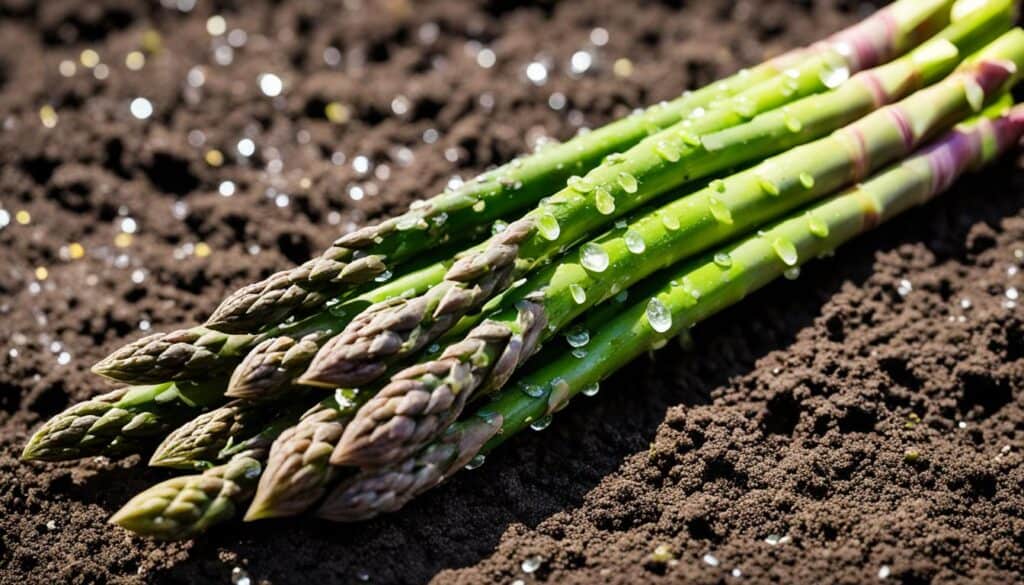Did you know that bulb vegetables, such as onions, garlic, shallots, leeks, fennel, scallions, radishes, and turnips, are not only flavorful but also pack a powerful nutrient punch? These vibrant and versatile vegetables offer numerous health benefits, making them an ideal choice for anyone looking to enhance their diet with healthy and delicious options.
Key Takeaways:
- Bulb vegetables, including onions, garlic, shallots, leeks, fennel, scallions, radishes, and turnips, are nutrient-dense and offer a wide range of health benefits.
- These vegetables are packed with fiber, vitamins, minerals, and antioxidants, contributing to overall health and well-being.
- Incorporating bulb vegetables into your meals can support cardiovascular health, promote bone health, and help prevent cancer.
- Experiment with different recipes and cooking methods to find your favorite ways to enjoy the flavors and benefits of bulb vegetables.
- Make bulb vegetables a regular part of your diet to enhance your overall health and well-being.
The Most Nutrient-Dense Veggies
Among the bulb vegetables, several stand out for their exceptional nutrient density. Spinach, with its high levels of vitamin A and K, as well as antioxidants, tops the chart. Carrots, rich in vitamin A and beta-carotene, have been associated with a lower risk of certain cancers. Broccoli, garlic, Brussels sprouts, and kale are also packed with vitamins, minerals, and compounds that offer various health benefits. Other nutrient-dense bulb vegetables include green peas, Swiss chard, beets, asparagus, red cabbage, sweet potatoes, collard greens, and cauliflower. Incorporating these vegetables into your meals can provide you with an array of essential nutrients.
One way to showcase the nutrient density of these vegetables is by comparing their nutritional profiles. The table below highlights the key nutrients and their respective amounts in 100 grams of each vegetable:
| Veggie | Vitamin A (IU) | Vitamin K (mcg) | Antioxidants |
|---|---|---|---|
| Spinach | 46900 | 483 | Yes |
| Carrots | 16706 | 13.2 | No |
| Broccoli | 623 | 101.6 | No |
| Garlic | 9 | 1.7 | Yes |
| Brussels Sprouts | 623 | 177.0 | No |
| Kale | 4815 | 681 | Yes |
| Green Peas | 476 | 24.8 | No |
| Swiss Chard | 3063 | 830 | Yes |
| Beets | 33 | 0.2 | Yes |
| Asparagus | 756 | 41.6 | No |
| Red Cabbage | 33 | 57 | Yes |
| Sweet Potatoes | 19218 | 2.3 | No |
| Collard Greens | 3333 | 426 | No |
| Cauliflower | 0 | 0 | No |
Health Benefits of Spinach, Carrots, and Broccoli
When it comes to incorporating nutrient-dense vegetables into your diet, spinach, carrots, and broccoli are essential choices. Each of these vibrant vegetables offers a plethora of health benefits that can contribute to your overall well-being.
Spinach: A Nutrient Powerhouse
I begin with spinach, which is not only low in calories but also packed with essential nutrients. This leafy green vegetable is an excellent source of vitamins A and K. Vitamin A is crucial for maintaining healthy vision, while vitamin K plays a vital role in bone health.
Additionally, spinach contains an array of antioxidants, such as beta-carotene and lutein, which have been shown to have potential cancer-protective properties. These compounds help neutralize harmful free radicals in the body, reducing the risk of cellular damage.
Carrots: Promoting Vitality and Cancer Prevention
Carrots are globally recognized for their bright orange color, crunchy texture, and distinctively sweet flavor. But beyond their culinary appeal, carrots are an excellent source of vitamin A, which not only supports healthy vision but has also been linked to a reduced risk of colorectal and lung cancers.
Furthermore, carrots provide other essential nutrients like vitamin C and potassium. Vitamin C has potent antioxidant properties that benefit the immune system, while potassium plays a crucial role in maintaining optimal blood pressure levels.
Broccoli: A Cruciferous Powerhouse
Broccoli, belonging to the cruciferous vegetable family, is a true nutritional powerhouse. This versatile vegetable is rich in vitamins K and C, which play key roles in promoting bone health and supporting the immune system, respectively.
In addition to vitamins, broccoli is an excellent source of folate and potassium. Folate is essential for cell development and growth, while potassium helps maintain healthy blood pressure levels. Moreover, broccoli contains sulforaphane, a compound that has been shown to have potential anticancer and anti-inflammatory properties.
| Vegetable | Health Benefits |
|---|---|
| Spinach |
|
| Carrots |
|
| Broccoli |
|
Garlic, Brussels Sprouts, and Kale for Immunity and Disease Protection
When it comes to boosting your immunity and protecting against diseases, incorporating garlic, Brussels sprouts, and kale into your diet can work wonders. These bulb vegetables are not only flavorful additions to your meals but also loaded with essential nutrients that support your overall health and well-being.
Garlic: Known for its pungent aroma and taste, garlic has been used for centuries for its medicinal properties. It contains important nutrients like selenium, vitamin C, and vitamin B6. Garlic’s active compound, allicin, has shown promising potential in supporting blood sugar and heart health. Animal and test-tube studies also suggest that garlic may possess cancer-fighting properties, making it a valuable addition to your daily meals.
“Garlic’s unique combination of nutrients and bioactive compounds makes it a powerhouse ingredient for supporting various aspects of our health.”
Brussels Sprouts: These miniature cabbage-like vegetables are rich in fiber and antioxidants, making them an ideal choice for promoting bowel regularity, heart health, and blood sugar control. Brussels sprouts contain kaempferol, a flavonoid that offers anti-inflammatory and cancer-fighting effects.
Kale: Considered one of the most nutrient-dense vegetables, kale is packed with potassium, calcium, copper, and vitamins A, B, C, and K. Its impressive nutrient profile has been linked to beneficial effects on blood sugar, cholesterol, and blood pressure levels. Including kale in your diet can provide robust support for your overall health.
By incorporating garlic, Brussels sprouts, and kale into your meals, you can strengthen your immunity and protect against diseases. These vegetables offer a powerhouse of nutrients that contribute to a healthy and resilient body.
Nutritional Comparison of Garlic, Brussels Sprouts, and Kale
| Vegetable | Calories | Protein (g) | Fiber (g) | Vitamin C (mg) | Vitamin K (mcg) | Potassium (mg) |
|---|---|---|---|---|---|---|
| Garlic | 42 | 1.8 | 0.6 | 9 | 0.2 | 166 |
| Brussels Sprouts | 38 | 3.4 | 3.3 | 48 | 78.2 | 342 |
| Kale | 33 | 2.9 | 2.6 | 41 | 818 | 299 |
Table: Nutritional Comparison of Garlic, Brussels Sprouts, and Kale
As seen in the table above, these vegetables offer a range of vital nutrients that contribute to a balanced diet. While garlic is low in calories, it provides essential vitamins and minerals. Brussels sprouts and kale are both low-calorie options that deliver high levels of fiber, vitamins, and minerals.
Next, let’s explore the benefits of incorporating more green peas, Swiss chard, and beets into your diet, focusing on gut health and disease prevention.
Green Peas, Swiss Chard, and Beets for Gut Health and Disease Prevention
When it comes to enhancing gut health and preventing diseases, incorporating green peas, Swiss chard, and beets into your diet is a smart choice. These nutrient-packed vegetables offer a wide range of health benefits that can support your overall well-being.
Green Peas: A Powerful Source of Fiber and Vitamins
Green peas are more than just a delicious addition to your meals. They are rich in fiber, protein, and vitamins A, C, and K. The fiber content helps to support digestive health by promoting regular bowel movements and preventing constipation. Additionally, green peas contain saponins, natural compounds that have been shown to reduce tumor growth and induce cancer cell death, potentially offering protection against certain types of cancer.
Swiss Chard: A Low-Calorie Nutritional Powerhouse
Don’t overlook Swiss chard when it comes to boosting your nutrient intake. This leafy green vegetable is low in calories but high in vitamins and minerals. Swiss chard offers a generous supply of antioxidants and plant compounds that have anti-inflammatory properties, which may help reduce the risk of chronic diseases such as heart disease and certain cancers. Including Swiss chard in your diet can be a flavorful way to fortify your body against illness.
Beets: Vibrant Roots for Heart Health and Athletic Performance
Beets are not only visually stunning but also incredibly beneficial for your health. Packed with fiber, folate, and nitrates, beets have been linked to improved heart health by helping to lower blood pressure. The nitrates found in beets can also enhance athletic performance by improving stamina and increasing blood flow to muscles during exercise. Enjoying beets as part of your regular diet can be a natural way to support cardiovascular health and optimize physical performance.
By including green peas, Swiss chard, and beets in your meals, you can promote gut health, protect against diseases, and nourish your body with essential nutrients. Try incorporating these vibrant and flavorful vegetables into a variety of dishes to enjoy their health-enhancing benefits.
Asparagus, Red Cabbage, and Sweet Potatoes for Nutrient Powerhouses
When it comes to nutrient powerhouses, asparagus, red cabbage, and sweet potatoes take the lead. These vibrant vegetables offer a range of essential vitamins, minerals, and antioxidants that are beneficial for your overall health and well-being.
Let’s start with asparagus, a versatile vegetable that is not only delicious but also rich in nutrients. It is a good source of folate, selenium, vitamin K, thiamine, and riboflavin. Folate is essential for cell growth and development, while selenium plays a crucial role in the immune system. Vitamin K is important for blood clotting and bone health, and thiamine and riboflavin contribute to energy production and metabolism.
Next, we have red cabbage, a beautiful and nutritious vegetable. It is packed with fiber and vitamin C, which are known for their antioxidant properties. Antioxidants combat oxidative stress in the body and help reduce LDL (bad) cholesterol levels. Including red cabbage in your diet can support your immune system and promote heart health.
Lastly, sweet potatoes are a delicious and nutritious addition to any meal. They are rich in fiber, potassium, vitamin B6, and vitamin C. The fiber content in sweet potatoes promotes healthy digestion, while potassium helps regulate blood pressure. Vitamin B6 is essential for brain development and function, and vitamin C supports a healthy immune system. Additionally, sweet potatoes contain beta carotene, which is converted to vitamin A in the body and supports eye health.
By incorporating asparagus, red cabbage, and sweet potatoes into your diet, you can ensure that you are getting a variety of essential nutrients. Whether roasted, steamed, or baked, these nutrient powerhouses add both flavor and health benefits to your meals.
Collard Greens and Cauliflower for Bone Health and Cancer Prevention
When it comes to maintaining strong bones and reducing the risk of cancer, including collard greens and cauliflower in your diet can make a significant difference.
Collard greens, a leafy vegetable, are packed with essential nutrients that promote bone health. They are an excellent source of calcium, fiber, vitamins A, C, and K. Calcium is crucial for maintaining strong and healthy bones, while the vitamins contribute to muscle function, hormone production, and overall bone health.
“Collard greens are a fantastic addition to any diet seeking bone health. They’re loaded with calcium and vitamins that support the skeletal system.”
In addition to bone health, collard greens have been linked to a lower risk of glaucoma and cancers such as colorectal and stomach cancers. The combination of fiber, vitamins, and antioxidants found in collard greens contributes to their cancer-fighting properties.
Similar to collard greens, cauliflower is a versatile vegetable that offers numerous health benefits. It is high in fiber, vitamins C and K, and other essential nutrients. The presence of compounds such as glucosinolates and isothiocyanates gives cauliflower potent cancer-fighting properties, protecting the body against the development of cancer cells.
A diet rich in collard greens and cauliflower not only strengthens bones but also helps prevent the occurrence of cancer.
The Benefits of Collard Greens for Bone Health
Collard greens are a powerhouse of nutrients that promote optimal bone health. Here are some key benefits:
- Calcium: Collard greens are an excellent source of calcium, a mineral vital for bone strength and density.
- Vitamins A, C, and K: These vitamins play a crucial role in supporting bone health, muscle function, and hormone production.
- Fiber: With its high fiber content, collard greens help maintain a healthy digestive system.
- Antioxidants: Collard greens contain antioxidants that protect the body from damage caused by harmful free radicals.
Incorporating collard greens into your diet can provide the necessary nutrients for maintaining strong and healthy bones.
The Cancer-Fighting Properties of Cauliflower
Cauliflower is not only delicious but also offers several health benefits, particularly in preventing cancer. Here’s why cauliflower is a valuable addition to your diet:
- Fiber: High in fiber, cauliflower aids in digestion and supports a healthy gut.
- Vitamins C and K: These vitamins contribute to overall wellness, including immune function and blood clotting.
- Cancer-Fighting Compounds: Cauliflower contains glucosinolates and isothiocyanates, compounds known for their potent cancer-fighting properties.
By incorporating cauliflower into your meals, you can take advantage of its cancer-preventive properties and enhance your overall well-being.
So, whether you’re looking to improve bone health or reduce your risk of cancer, don’t forget to include collard greens and cauliflower in your everyday meals.
The Role of Onions and Alfalfa Sprouts in Health and Well-being
Onions and alfalfa sprouts are two powerhouse ingredients that can significantly contribute to your overall health and well-being. Let’s explore their unique benefits and how you can incorporate them into your daily meals.
The Health Benefits of Onions
Onions, known for their distinct flavor and versatility in cooking, offer much more than just taste. These bulbs are rich in bioactive compounds that have been linked to various health benefits. Studies suggest that regular onion consumption may help reduce the risk of certain cancers, including stomach, colorectal, and prostate cancers. Additionally, onions contain vitamins C and B6, which support immune function and play a crucial role in brain development and function.
The Nutritional Power of Alfalfa Sprouts
When it comes to nutrient density, alfalfa sprouts are standouts. These tiny sprouts are packed with essential vitamins, minerals, and antioxidants that can support your health in multiple ways. Alfalfa sprouts are rich in flavonoids, phytoestrogens, and saponins, which possess health-promoting properties. These compounds are known to have antioxidant effects, which help protect your body against cellular damage. Additionally, the high fiber content in alfalfa sprouts supports gut health and may aid in weight management.
| Onions | Alfalfa Sprouts |
|---|---|
| Reduced risk of certain cancers | Antioxidant-rich |
| Contain vitamins C and B6 | Support gut health |
| Rich in manganese | May aid in weight management |
By including onions and alfalfa sprouts in your meals, you can harness their incredible health benefits and improve your well-being. Whether it’s adding raw onions to salads, incorporating them into sautéed dishes, or topping your meals with alfalfa sprouts, these ingredients can elevate both the nutritional value and flavor profile of your food.
“The art of cooking with onions and alfalfa sprouts lies not only in their taste but also in the positive impact they can have on your health. Don’t miss out on these incredible ingredients!”
The Beauty of Tomatoes and Bell Peppers
When it comes to beautiful and nutritious vegetables, tomatoes and bell peppers steal the show. Although tomatoes are technically a fruit, they are commonly treated as a vegetable in culinary preparations. These vibrant, juicy delights not only add a burst of color to your dishes but also offer a wide range of health benefits.
Tomatoes are rich in potassium, vitamins C and A, and lycopene, an antioxidant that has been linked to prostate cancer protection and eye health promotion. Including tomatoes in your diet can help support the overall health and vitality of your body.
Bell peppers, available in various colors, are also a feast for the eyes and the body. These crisp and flavorful vegetables are packed with antioxidants and vitamin C, which play an essential role in supporting your skin health. They aid in fighting signs of aging, ensuring your skin looks radiant and youthful.
Incorporating tomatoes and bell peppers into your meals not only enhances the flavor but also supports your beauty from within. So, add these colorful and nutritious vegetables to your shopping list and savor their natural beauty and health benefits.
Incorporating Bulb Vegetables into Your Diet
To fully enjoy the health benefits of bulb vegetables, it’s important to incorporate them into your daily diet. You can include them in a variety of ways, such as adding onions and garlic to sautéed dishes or roasted vegetables, topping salads with raw shallots or scallions, or using leeks in soups and stews. Fennel can be enjoyed raw in salads or roasted as a side dish. Radishes and turnips make great additions to salads or can be enjoyed as crunchy snacks. Experiment with different recipes and cooking methods to find your favorite ways to incorporate bulb vegetables and make them a regular part of your nutritious meals.
Recipe Ideas
- Sautée sliced onions, garlic, and bell peppers for a flavorful stir-fry.
- Roast a mixture of sliced onions, garlic, carrots, and beets for a colorful and nutritious side dish.
- Add chopped scallions or shallots to your favorite salad or sandwich for an extra burst of flavor.
- Make a hearty batch of vegetable soup with leeks, carrots, turnips, and spinach.
- Try oven-roasted fennel wedges seasoned with olive oil, salt, and pepper for a tasty side dish.
- Slice radishes and toss them with mixed greens, cherry tomatoes, and a zesty vinaigrette.
“Incorporating bulb vegetables into your diet is a simple and delicious way to boost your nutrient intake and add variety to your meals.” – Dietitian Jane Smith
| Bulb Vegetable | Health Benefits |
|---|---|
| Onions | Rich in antioxidants and anti-inflammatory compounds that may reduce the risk of certain diseases, such as heart disease and cancer. |
| Garlic | Contains compounds that may help lower blood pressure, improve cholesterol levels, and support immune function. |
| Shallots | Packed with vitamins and minerals, including potassium, vitamin A, and vitamin C, which contribute to overall health and well-being. |
| Leeks | Provide a good source of fiber, vitamin K, and vitamin B6, which are essential for a healthy digestive system and brain function. |
| Fennel | Offers fiber, vitamin C, and potassium, supporting digestive health, immune function, and heart health. |
| Scallions | Contain beneficial compounds that may help lower cholesterol levels and support healthy digestion. |
| Radishes | High in fiber and vitamin C, radishes can aid digestion, support skin health, and provide a refreshing crunch to dishes. |
| Turnips | Rich in vitamins, minerals, and antioxidants, turnips offer immune-boosting properties and may help reduce inflammation. |
Conclusion
In conclusion, incorporating bulb vegetables such as onions, garlic, shallots, leeks, fennel, scallions, radishes, and turnips into your daily diet is a smart and delicious choice. These flavorful vegetables not only add depth to your meals but also provide a multitude of health benefits. From supporting cardiovascular health to promoting bone health and cancer prevention, bulb vegetables are packed with essential nutrients, fiber, vitamins, minerals, and antioxidants.
By including bulb vegetables in your meals, you can boost your overall health and well-being. Whether you enjoy them raw in salads, sautéed in stir-fries, roasted as a side dish, or as a crunchy snack, there are endless possibilities to incorporate them into your favorite recipes. So why not embrace the world of bulb vegetables and make them a regular part of your nutritious meals?
Start exploring the vibrant flavors and health benefits that bulb vegetables have to offer. With their incredible nutritional profile and versatility in cooking, they are sure to enhance the taste and nourishment of your dishes. So remember to stock up on onions, garlic, shallots, leeks, fennel, scallions, radishes, and turnips, and enjoy the many reasons why they are truly your healthy choice.










Leave a Reply